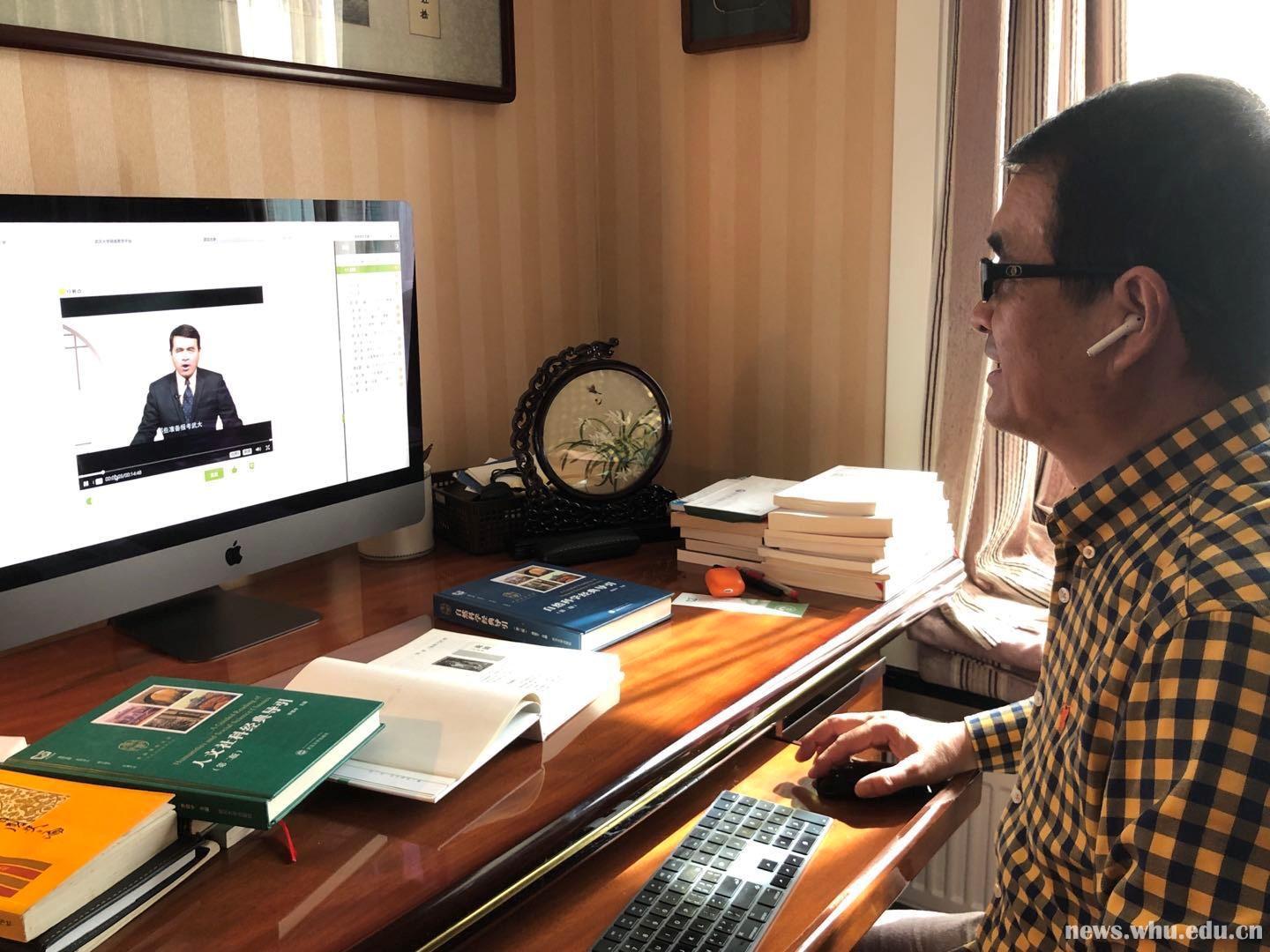Spring Semester 2020 of Wuhan University (WHU) began on February 17, when online courses made their debut in place of traditional ones owing to the outbreak of COVID-19. Teachers switch to deliver lectures online no matter where they are: in Wuhan or not, at home or abroad, in cities or in mountain villages, on the anti-epidemic front line or not.
WHU devotes itself to teaching planning and aims to enlighten students. By March 2, 1,848 teachers have offered 4,110 online courses for 23,182 undergraduates; the university has also provided 689 courses for postgraduates, accounting to 95.17% of all classes. The online teaching rate of compulsory courses reached 100%. During the epidemic, teachers instructed the students through various methods to enhance their learning at home.

On February 19, Professor Li Jianzhong, a famous teacher in China and director of the General Education Center of WHU, presented an online course for 118 students in School of Geodesy and Geomatics on “Guidance on liberal arts during the epidemic”.
Teacher as doctor
The affiliated hospitals of WHU have been playing a key role in the battle against the coronavirus. Renmin Hospital and Zhongnan Hospital of WHU are two designated hospitals for the treatment of novel coronavirus pneumonia. They also assisted Huoshenshan Hospital, Wuchang and Wuhan Keting Fang Cang makeshift hospitals. In the new semester, teachers of WHU in the affiliated hospitals performed their duties as a teacher in addition to a doctor. On February 17, 3,270 undergraduates from School of Medicine of WHU greeted their teachers whom they have been missing for a long time in the online classrooms.
Liu Hanxing, deputy chief physician of the Department of Neurology at Zhongnan Hospital of WHU, was infected with the novel coronavirus when fighting at the frontline. After his recovery, he volunteered to relieve his colleagues’ pressure on the front line against the virus by sharing their teaching task of neurology for undergraduates. Prof. Wu Kaisong from the Department of Respiratory and Critical Care Medicine worked in the hospital during the day, and prepared and recorded teaching videos in the evening.
Those doctor-and-teachers are both courageous fighters in the battle against the epidemic and inspiring mentors of medical students on their way to mature doctors. Their exemplary act reflects the oath of “eliminating man’s suffering and enhancing man’s health”.
Epidemic as textbook
“Is the spread of the epidemic related to urban layout? How can we provide a fine urban environment, improve the quality of life, discover and solve urban space problems? When the epidemic ends, how can the city’s memory of it be preserved? How can a city draw lessons from the disaster?” Li Jun, a professor of the School of Urban Design, identified the theme of the “Urban Design” course this semester as “Planning and Design of Anti-epidemic Memorial Sites”. By doing so, she intended to inspire students regarding how such urban layout can affect social events and the life quality of the citizens.
Meng Yingying, an associate professor from the School of Political Science and Public Management, held a seminar on public crisis management during the epidemic. Zhou Xiaoming, another associate professor from the school, discussed with students what challenges have been placed to the international law by the declaration of the novel coronavirus outbreak as a “public health emergency of international concern”. The “World of Microorganism” course, a public elective from the College of Life and Sciences, covers knowledge concerning COVID-19, which raised a heated discussion among the students.
Wu Chong, a graduate student from the Space Information Engineering Institute, School of Geodesy and Geomatics, works on Public Safety. During the Spring Festival, he brought his specialty into full play and developed a system of epidemic prevention and monitor within mere three days. The system has been piloted in Sansui County, Guizhou Province, satisfying requirements of local government against the disease.
The reality is the best teaching material, inspiring students to ponder both perceptually and rationally. The teachers of WHU convert the “epidemic” into the “textbook”, and blend their responsibilities into teaching. As a result, online courses are not only fascinating but profound.
Class as promise
Due to the sudden outbreak of the coronavirus, the teachers were stuck far and wide. How to establish online courses became a matter of great urgency.
The primary challenge lies in the technical difficulties. For many elderly professors, this is the first time to deliver online lectures. They are accustomed to paper-based reading and face-to-face teaching without the Internet. To solve this problem, the university released “Simple Operation Guidelines for Virtual Classes”. Each school also made their own “walkthroughs”, while teachers spontaneously helped each other. Chen Fang, a 59-year-old teacher from the Department of Biochemistry and Molecular Biology, used her mobile phone and a borrowed tablet computer to conduct her first “touch-screen teaching” under the help of young teachers. The class achieved good effects.
Yin Jun, a teacher from the Pathophysiology Teaching and Research Office, taught the “Neuron Science” course to medical students. The stable platform, his skilled operation of the software, and the cute eye exercises of Baymax series broadcast during the break won students’ admiration, “Our teacher is so good at this!”
Prof. Thomas Besch from the School of Philosophy was stuck at home in Australia. This semester he offers two graduate courses, one of which is “English for Philosophical Majors”. Thomas followed the group tutorial approach at Oxford University by dividing the class into four groups, each with 5-6 students. Then half an hour of teaching time was allocated to each group, so that students could interact with him as much as possible.
“Although we are thousands of miles apart, the moment I saw Prof. Besch was really cheerful. We will be as diligent, active, and reflective as before.” Wu Hang, a graduate student from the School of Philosophy, said that the first class went smoothly, seemingly brought him back to the familiar campus.
Teachers also began to think about how to improve traditional teaching by means of the Internet after a week of online teaching. Xiao Shengzhong, an associate professor from the College of Chinese Language and Literature, believes that there are many advantages in online teaching. For example, students can watch the teaching recordings repeatedly, interact more actively with teachers and classmates, and think more. “At present, many students feel awkward to express themselves in a physical classroom. But they show great enthusiasm online. This is a chance for contemporary college students to voice their opinions, and it is also a new trend for us to improve our teaching methods.”
Rewritten by Wei Yena & Ruan Zehan
Edited by Zhou Siyan, Li Yushan, Zheng Yayun
Source: http://paper.jyb.cn/zgjyb/html/2020-03/02/content_576468.htm?div=-1


